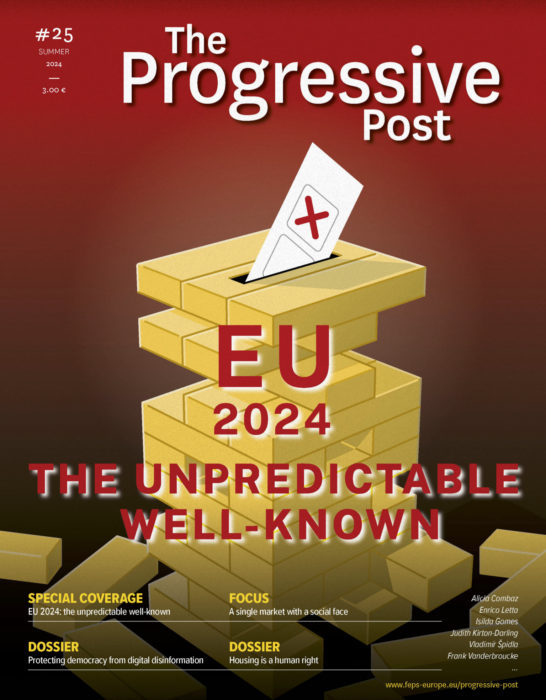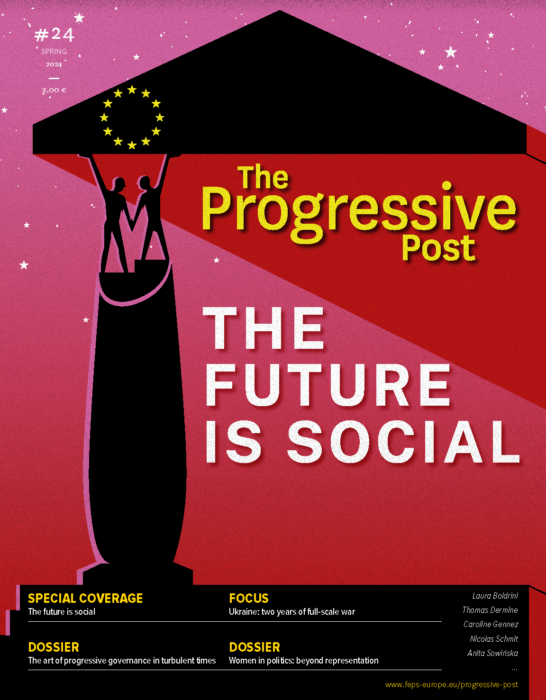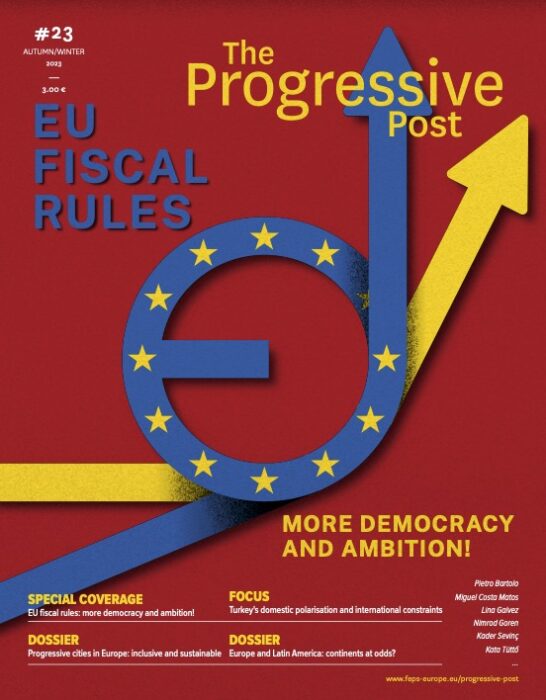"Our common task is: to create a „Next Left‟, to show that we have the ideas to meet the challenges our societies face, and can win the public's trust to earn the chance to try to make our vision for social change a reality. This will not be easy. Look around Europe in 2008 and, almost everywhere, social democracy is in trouble politically." That was the first words delivered by Sunder Katwala, Secretary General of the Fabian Society Member of the board of FEPS in the speech he delivered at the SP.a Convention, in Brussels on 18 October 2008
"Thank you for inviting me to take part in your conference. It is also a great honour to speak this morning in advance of Caroline Gennez. Caroline is among the leading voices of the emerging generation of political leaders across Europe. So we all invest much hope in her ability to bring both new ideas and new campaigning energy to the politics of social democracy.
Yet open the newspaper any morning and it should be clear why our values and ideas are needed more than ever before. The issues of our times demand that this should be an age of a new social democracy. It is up to us to make it so.
I want to talk about two of the challenges we face:
* How can we show that social democrats have a distinctive response to the current financial crisis.
* And how do we make that part of our argument for a fairer society?
We meet at an extraordinary time following the financial crisis. Nobody can accurately predict the consequences. That is not just a question of how markets respond or even the broader economic impact. Much will depend on the political and public debates we now begin.
Will it be social democrats or the parties of the right which win the trust to respond? It should be us. But If we fail, people may turn away from politics entirely at the very time it is needed most.
During a crisis, even more nonsense is talked in politics than is usual? One Eurosceptic commentator in Britain, Simon Heffer, has declared that government investment in the banking system heralds a “new age of Bolshevism”. That might surprise Gordon Brown, the co-founder of New Labour in Britain and his fellow European social democrats.
Perhaps it could surprise Angela Merkel, Nicolas Sarkozy and Europe‟s centre-right even more. But don‟t forget that it is the US government - the Bush administration no less - which has undertaken the largest market interventions and nationalisations of any western government.
Our economies are linked. So governments everywhere – from different political traditions – had to act.
But what about the argument that government intervention is always the problem, and that whoever governs least governs best? We have heard a great deal of that market fundamentalist argument for 25 years. In this crisis, it went missing in action, rejected by its friends. Why? Because the ideology of leaving everything to the „hidden hand‟ of the market had just as little practical advice as the old Marxist view that there is nothing to do but wait for the collapse of capitalism.
Social Democrats, as the constructive left, know we must provide concrete, real world solutions to deal with the economic fallout, and ensure too that we root those in our broader vision of the common good.
But the right still doesn‟t get it. Even where their finance ministers or prime ministers acted, they wanted to stress how reluctant they were. Listen and you can hear an argument which goes something like this:
“We realised that we had to act. But let us tell you: we did not want to intervene. We delayed. the market would turn something up
What we have done offends our core instincts. We admit, we are confused .Our world seems to have become very complicated. But we‟ll try to get back to normal soon”
This is not good enough. If the right will not understand why action was necessary, it will not be able to learn the lessons, or advance the changes which we need.
Social Democrats must reject the view that we need to get back to business as usual.
We must remind ourselves, our opponents and the public of some important social democratic truths.
Firstly, there is no such thing as the free market. Markets can not operate without rules which governments must provide.
Social Democrats believe that markets should have an important place in a democratic and free society. Few of us could imagine our lives without the opportunities and choices which markets provide. But the power of markets is always both creative and destructive.
Our argument with those who have shouted „markets good, governments bad‟ for the last 25 years is not to say the opposite: „governments good, markets bad‟. But we do know that we can only have markets when they are governed by rules. Indeed, we need rules to protect market competition itself: that is why governments act to prevent unfair monopoly power.
That markets can not exist without rules is never more clear than when they provide essential public goods. Of course, no government could let the banking system fail, nor indeed other regulated markets in energy, transport or communications. That reality must be properly reflected in how we share the risks, responsibilities and rewards, in a new approach to regulation and taxation.
Secondly, knowing that there is an important place for the market economy is not the same as accepting that markets should determine the values of our society.
The proud achievements of social democracy have been to remove essential foundations of political and social citizenship from the sphere of the market: first, the right to a political voice and a vote; then the provision of education and healthcare.
That gave us the social welfare settlement which gave Europeans an era of peace and prosperity, underpinned by our shared social commitments to protect each other from the worst risks. We turned those values into the common sense of most European societies.
We need to adapt these models when our societies change, but we sustain the values and principles that underpin them. A free market can not deal with climate change: we must now put in place the national and international governance so that markets must pursue prosperity, social justice and sustainability.
Thirdly, democratic societies also govern markets to maintain the public support on which their licence to operate depends.
The historic role of social democracy has never to abolish capitalism, but sometimes to tame it. Our politics has often been needed to save capitalism from both its worst excesses and its worst advocates.
This crisis damages public trust in both governments and markets. If governments had to act to prevent failure, there can not be a licence to let the risks pile so high. There is rightly public anger at what looks too much like a one-way bet. A small group at the very top has poured scorn during the good times on any idea of social responsibility: celebrating excess, championing tax avoidance, acting for all the world as if they wish to be entirely separate from the rest of our society.
But when, when trouble arrives, after years of telling government and society to mind their own business, the same people turn around and ask us all to act to rescue the system and sort out the mess. After that, it is very clear that the rules must change.
Social Democracy after the crisis
Governments of left and right agreed on the need to act in an emergency, because the right ducked the away from the logic of its own anti-government rhetoric.
But social democrats must make the differences clear. Firstly, some differences have already been seen. The strong plan from Gordon Brown’s Labour government in Britain, which has helped to inform European-wide responses, was very different to the initial plan proposed in the United States. That American plan was to spend hundreds of billions of taxpayers‟ dollars to buy up the „toxic debts‟, to bury it somewhere as if it were nuclear waste, with no return to the public, so that the bankers could get back to making their profits.
The important social democratic argument in Britain and across Europe has been that public funding and guarantees had to be combined with tests to protect savers and taxpayers be protected? What system of public accountability would be in place?
* When public guarantees allow banks to return to profitability, how should we share in the gains, and not just the risks?
* to ensure new responsibilities go with public support?
Social Democrats must now push, whether in government or opposition, for scrutiny and accountability and the public interest d in the different national plans.
Secondly, Governments must act again: to create the new international systems of fair rules
Our Eurosceptics who say „we only wanted a Europe of free trade‟ always forget that you can‟t have a continental single market without the rules to make it happen, and that support for the single market depends on a social dimension too.
If markets need rules, a global economy needs global rules. We have political choices about how we govern globalisation. The gains and the losses from global markets will fall very unevenly. We will not rebuild public support unless we ensure the rewards are shared more widely than they have been so far.
Change is in the air internationally too. We need a new multilateralism. So every Social Democrat will not just want the Democratic candidate Barack Obama to win the White House but to reinstate the tradition of the better America, which used its power wisely to help reconstruct Europe and to put in place a multilateral system of rules. Let that America return when we enter the era of “The World After Bush” on January 20th next year.
Thirdly, Social Democrats must also bring these arguments home to national politics. The right analysis is not enough if we do not win the political argument too. So we need to put our core belief in a fairer and more equal society in terms which the public can understand.
Equality can be easily misunderstood, as a very abstract argument, or as levelling down and penalising success.
But we can make a compelling public argument for fairness. Go into a hospital ward, and find two babies born that day to mothers from different backgrounds. It is too easy to predict how they will do at school, what they will earn, even how long they are likely to live. Some people may beat the odds, but the odds should not be so steep. The mission of social democracy is to engage in a „fight against fate‟ so that where we are born and the parents we are born to do less to determine our outcomes and opportunities in life. This means a politics of fair chances, fair rewards and fair contributions.
Fairer chances means social democratic progress in creating major new issues of the early years, education and skills, and preventing income and wealth gaps becoming so wide that social mobility ends, so that unequal opportunities are inherited across generation.
Fair rewards while challenging those which reward spectacular failure, and incentivse irresponsible behaviour. When pay differences between the boardroom and shop floor are not 20 to 1 but instead 200 to 1 then scrutiny – within boards, from shareholders and from the public - is required to challenge and change the „rewards for failure‟ culture. Fair contributions because we all have a stake in a shared society where all are subject to rights and responsibilities. If our political opponents are successful in persuading people that they have nothing in common – if our society becomes segregated into separate groups, whether that is by race, or faith, or age, or income and class, each looking out only for itself, then we will not be able to build the coalitions on which social democratic politics of fairness depends.
We can expect other parties will say they are for fairness too. But will they do anything about it?
We must win the argument that “Fairness doesn’t happen by chance”. Fairness depends on the political choices we make, and what governments do.
So did Bill Clinton‟s Third Way argument that „the era of big government is over‟ –concede too much territory to the anti-government mood of the Reagan and Thatcher era? Perhaps it did. The problem with effective soundbites is that they can sometimes be too effective. Everbody forgets the rest of the argument, which was the following:
Ever since the Reagan Revolution of 1980, the dominant Republican argument has shifted from 'less government is almost always better than more of it' to 'government is 'always the problem'.
We take a different view. We say the era of big government is over, but we must not go back to an era of „every man for himself‟
. We know from experience that there are some things that government must do: protect us against enemies, , come to our aid when disaster strikes, help fight crime, ensure the health and well-being of the weakest among us, preserve the environment, ensure the safety of our food and provide everyone with access to quality education. We don't want our government in our face, but we do want it on our side when we need it, and quickly.
That positive argument got lost. We need to remind people of it again So let us remember the warning that government can be too strong, too bureaucratic and not responsive enough - as long as we recognise that government can fail to respond to citizens by being too weak too.
When it comes to dealing with failed states, meeting the millennium development goals, enabling our economies to achieve low carbon growth and creating the global deal we need on climate change, ensuring integration and equal citizenship across our societies, we will need more and better government, not less.
New politics
Our greatest challenge may be political.
Over the last decade, Europe‟s social democrats have often been better at government than at politics.
And this age of anti-politics presents a profound challenge for those who want to govern, who must build broad coalitions in the electorate, who make promises that they may have to keep, who know that political progress involves compromises where we can not immediately get everything we want.
Oppositionist anti-politics, whether on the right or left, which does not need to offer any answers if it can authentically voice the anger of any specific group.
We need a social democracy of the head and the heart - which does has credible policy answers but which offers an emotional appeal to mobilise too.
We will need to change the way we do politics too. Few, if any, institutions have a prouder record of bringing change to our societies than our political parties. But will we feel like the most obvious or effective forces for social change for the new progressive movements of the future? I hope the rest of us can learn from your efforts to change the culture of political campaigning.
We need a social democratic future. But There are no inevitable historical forces which will decide what happens: it is a shame the neo-conservatives had to do so much damage to find that out.
Yet if that were true, there would be no need for politics, or for our parties at all.. But we are all here because we know why politics matters.
We know that the need for social democracy is as great as ever. Now we must show that we can win the public arguments to make it happen."














